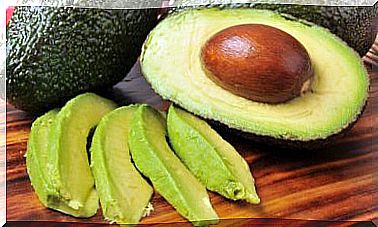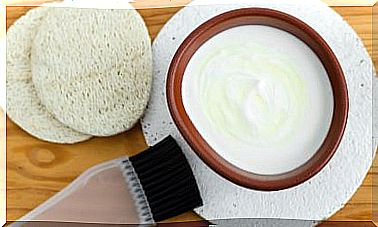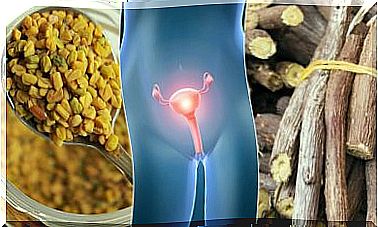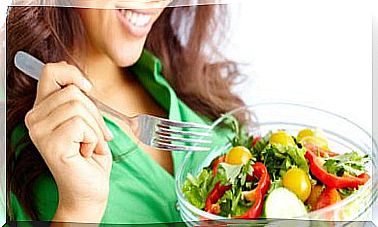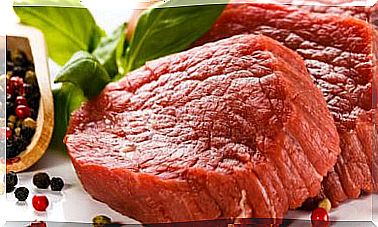Gastroesophageal Reflux: How To Calm Its Symptoms With Changes In Diet?
Gastroesophageal reflux is evidenced by heartburn and regurgitation. If you suffer from these symptoms, it is surely advisable to modify your diet and general habits.
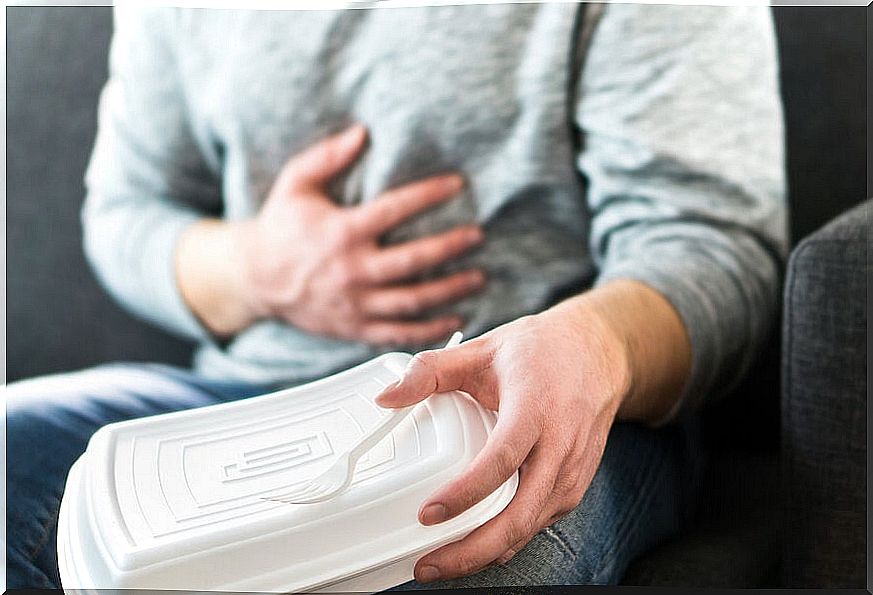
The GERD diet is not the same as any other balanced diet. To calm the symptoms of this disease it is necessary to avoid certain foods that exacerbate it.
In this article, we will tell you about the changes you should make to feel better and avoid the main discomforts caused by gastroesophageal reflux.
What is gastroesophageal reflux?
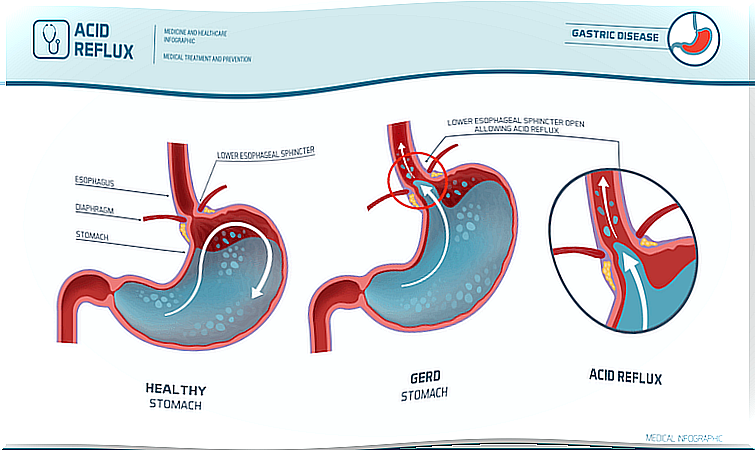
Gastroesophageal reflux occurs when the muscle at the end of the esophagus – the tube that carries food from the mouth to the stomach – does not close properly. For this reason, stomach acids can move up into the esophagus, irritating it.
If you suffer from this disease, you will surely feel heartburn, a burning in your throat. Feeling stomach fluid at the back of the mouth (regurgitation), having a dry cough, or having trouble swallowing are also part of the symptoms of gastroesophageal reflux.
To calm these annoying symptoms you can:
- Eat small portions during meals.
- Avoid highly seasoned, fatty or acidic foods.
- Eat a diet for gastroesophageal reflux.
- Do not drink alcohol.
- Lose weight, if you are overweight.
Diet for gastroesophageal reflux
To improve the symptoms generated by this disease, it is not only necessary to eat a healthy and balanced diet, but also to avoid irritating foods. Here are some tips.
1. Balanced diet

Your doctor will advise you to adapt your eating habits, so that you consume the appropriate amounts of vegetables and fruits every day, as well as cereals and legumes.
Vegetables provide vitamins and minerals while being low in fat and sugar. Good options to reduce acidity are asparagus, cauliflower, broccoli, potatoes, and cucumbers.
Among fruits, we advise you to avoid citrus fruits that can generate acidity, as well as tomatoes. Better eat bananas, apples, pears, and melons.
Among the cereals, oats stand out. Choose whole grain varieties without added sugar, you will not only get fiber for your body but you will see how it helps reduce heartburn. You can also opt for rice and whole grain breads.
2. Avoid coffee
Coffee is one of the foods that you should eliminate from your diet for gastroesophageal reflux because it is irritating and can increase stomach acidity. Instead, we suggest you drink herbal teas: thyme, orange, hops or chamomile.
3. Eat 5 meals a day
By eating five meals a day, you will eat less. In this way, you will avoid overloading the stomach and minimize the chances of food returning from it to the esophagus.
4. No spicy foods
Seasonings such as hot paprika, chilli, vinegar, cayenne pepper, and curry irritate the lining of the stomach, exacerbating acidity.
5. Increase the consumption of Omega 3 and Omega 6
Omega 3 and Omega 6 fatty acids have anti-inflammatory qualities that can help reduce inflammation of the mucous membranes of your stomach. Take the opportunity to eat fish and shellfish, always avoiding fried foods and opting for healthy cooking.
6. Don’t eat fried
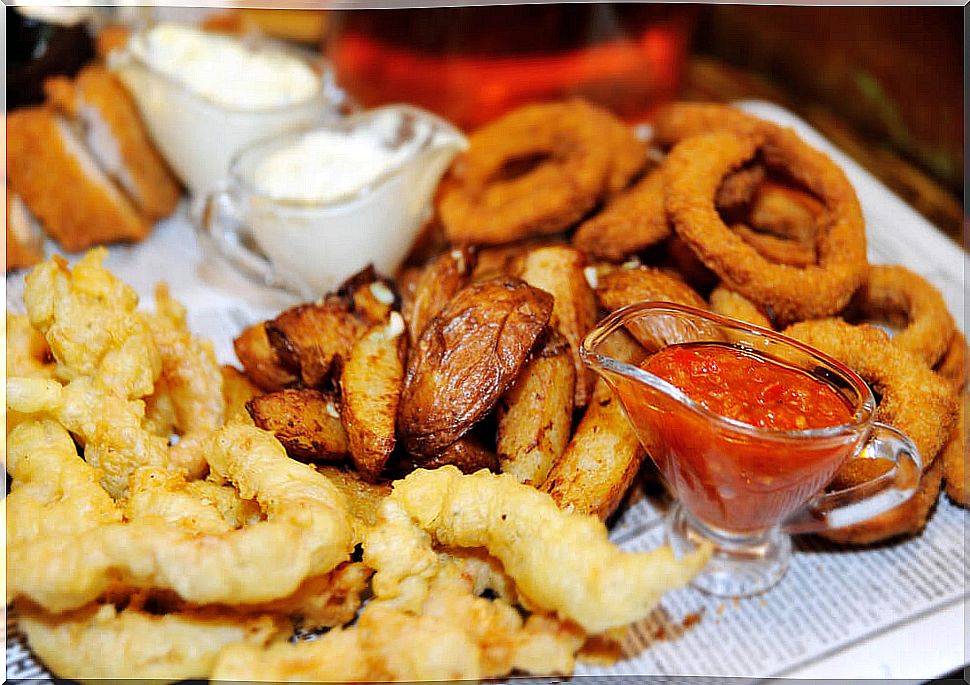
Fried and fatty foods should be eliminated from the diet for gastroesophageal reflux. Fatty foods make digestion difficult, forcing the stomach to work harder and producing more acid. Choose another kind of cooking: steamed, boiled, baked, microwave or in papillote .
7. Consume little liquid at meals
Drink fluids during the day but not during meals (or drink little). Thus, you will avoid filling the stomach to its maximum and overloading it. Remember that water should be the drink of choice, compared to soft drinks and juices that are also considered irritants.
8. Choose low-fat dairy
As we have already said, fat makes digestion difficult, and can exacerbate reflux symptoms. Eat better yogurts, milk and skimmed cheeses. Its digestion will be less difficult for your body.
9. Avoid exercising after eating
Sports after a meal can promote the appearance of gastroesophageal reflux. If you practice sports, try to do it after two hours from the moment of ingestion of food.
10. Dinner at least two hours before going to sleep
The lying position can exacerbate the symptoms of GERD. Have an early dinner to allow your body to digest before going to bed. You can also sleep with high pillows that allow you to have your head higher than your body to reduce discomfort.
11. Don’t smoke
Tobacco is not a food but it can also act as an irritating agent. If you have GERD symptoms and smoke, we recommend giving up tobacco for your health and comfort.
12. Eat healthy fats
Olive, sesame or sunflower oil, avocados, walnuts and flax seeds provide healthy fats to the body. Consume these foods in salads, toasts, and all kinds of dishes.
13. Goodbye chocolate and gum
One of the ingredients in chocolate is methylxanthine, a component that helps relax smooth muscle and increases the possibility of reflux. Chewing gum as well as mint-flavored candy can cause heartburn.
14. Eat ginger
Ginger has anti-inflammatory properties that can help ease the discomfort of gastroesophageal reflux. You can consume it as a condiment for your meals or prepare a ginger infusion.
Consult with your doctor about the best diet for gastroesophageal reflux according to your nutritional and caloric needs. He will guide you on the path to calming your symptoms.
